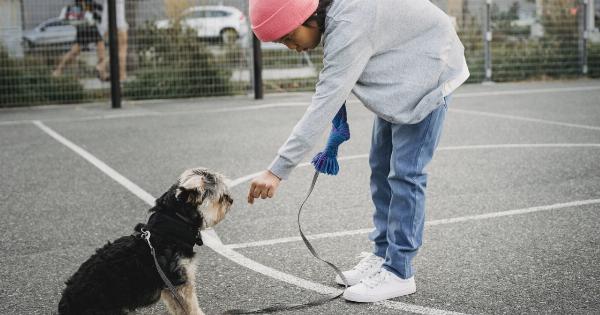Animal-assisted interventions (AAIs) have gained popularity in recent years as a unique and effective way to improve the wellness of both humans and animals.
These interventions involve incorporating animals into therapeutic or educational settings to provide emotional support, companionship, and mental health benefits. While AAIs have been widely recognized for their positive impact on human well-being, their benefits for the animals involved are often overlooked.
In this article, we will explore how animal-assisted interventions can enhance the wellness of pets and contribute to their overall happiness and quality of life.
The Power of Animal Companionship: A Lifeline for Pets
Pets play a significant role in the lives of millions of people around the world. They offer love, loyalty, and companionship, and studies have shown that having a pet can have numerous benefits on human physical and mental health.
However, pets themselves can also experience challenges and hardships that may impact their well-being. This is where animal-assisted interventions come into play, as they provide a valuable avenue for improving pet wellness.
Reducing Stress and Anxiety
Just as animals can alleviate stress and anxiety for humans, they can have the same effect on their fellow furry friends.
Interacting with animals, whether it’s through petting, playing, or simply being in their presence, has been shown to reduce cortisol levels, the hormone associated with stress, in both humans and animals. Studies have found that having access to animal companionship can help lower blood pressure, decrease heart rate, and promote relaxation for pets.
By participating in animal-assisted interventions, pets can experience a significant reduction in stress and anxiety, leading to improved overall wellness.
Enhancing Socialization and Emotional Well-being
Pets, like humans, can sometimes face social challenges that may impact their emotional well-being. Animal-assisted interventions create opportunities for pets to engage with other animals and humans in a supervised and controlled environment.
This interaction helps pets improve their social skills, boost confidence, and enhance their overall emotional well-being. Through activities such as group training, play sessions, and therapy sessions, pets can build relationships, learn to trust, and become more sociable creatures.
Improving Cognitive Function and Mental Stimulation
Animals require mental stimulation just like humans do to maintain a healthy mind and prevent cognitive decline. Animal-assisted interventions provide pets with various activities and exercises that engage their minds and promote mental growth.
Training sessions, puzzle toys, and sensory experiences are some examples of interventions that can improve a pet’s cognitive function. By stimulating their brains, pets can remain mentally sharp, reduce the risk of behavioral issues, and experience a higher quality of life.
Assisting in Physical Rehabilitation
For pets recovering from surgery, injury, or illness, physical rehabilitation is often a crucial part of their recovery process.
Animal-assisted interventions can play a role in the rehabilitation journey by providing pets with opportunities for gentle exercises, mobility training, and therapeutic touch. The presence of animals can motivate and encourage pets to participate in physical activities, promoting faster healing and enhancing their overall physical well-being.
Boosting Confidence and Self-Esteem
Pets, just like humans, can struggle with confidence and self-esteem. Animal-assisted interventions can help pets develop a sense of confidence and improve their self-esteem through positive reinforcement and interaction with animals and humans.
By successfully completing tasks during training sessions, pets can feel a sense of accomplishment, boosting their self-confidence. Additionally, the unconditional love and acceptance pets receive from humans during these interventions contribute to improved self-esteem and an overall positive sense of self.
Providing a Sense of Purpose and Meaning
Animals thrive when they have a sense of purpose and meaning in their lives, just like humans. Animal-assisted interventions offer pets the opportunity to engage in meaningful activities that go beyond their usual daily routines.
Whether it’s being part of a therapy team, assisting in educational programs, or providing emotional support to individuals in need, pets involved in these interventions have an important role to play. By participating in animal-assisted interventions, pets can experience a sense of purpose, contributing to their overall well-being and happiness.
Facilitating Positive Behavioral Changes
Pets may sometimes exhibit behavioral issues due to various factors such as anxiety, fear, or boredom. Animal-assisted interventions can help address these issues by providing pets with a structured environment and positive reinforcement techniques.
Through training sessions and activities tailored to the pet’s specific needs, undesirable behaviors can be replaced with more desirable ones. By facilitating positive behavioral changes, animal-assisted interventions enhance the overall wellness of pets and improve their relationships with their human companions.
Promoting Bonding with Human Companions
Animal-assisted interventions create unique opportunities for pets to bond with their human companions in a deeper and more meaningful way.
By participating in activities together, engaging in petting and grooming sessions, or simply spending quality time in each other’s company, the bond between pet and owner is strengthened. These experiences foster a sense of trust, affection, and mutual understanding, contributing to the emotional well-being of both the pet and the human.
Spreading Awareness and Advocacy
Animal-assisted interventions not only benefit individual pets but also play a vital role in spreading awareness about the importance of animal welfare and advocacy.
Through their involvement in therapy and educational programs, pets become ambassadors for their species, helping to promote responsible pet ownership, animal protection, and the overall well-being of all animals. By becoming advocates, these pets contribute to a larger movement that aims to create a better world for animals everywhere.
Conclusion
Animal-assisted interventions have proven to be a valuable tool in improving the wellness of both humans and animals. By recognizing and understanding the benefits of AAIs for pets, we can enhance their overall happiness and quality of life.
From reducing stress and anxiety to promoting socialization, physical rehabilitation, and positive behavioral changes, AAIs offer a wide range of advantages for our beloved animal companions. It is important to continue researching and supporting animal-assisted interventions to ensure the well-being of pets and to strengthen the bond between humans and animals.































